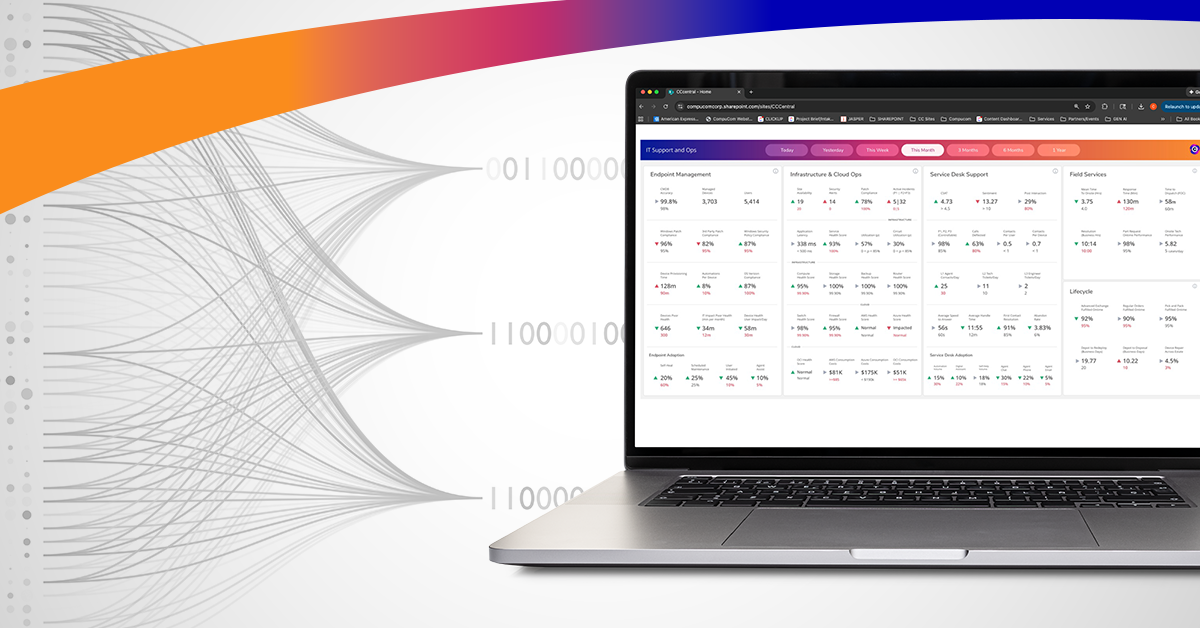- Device Lifecycle Services
- Full Lifecycle Observability


Emma Mak • Staff Writer
Doesn’t it feel like AI is in everything these days? AI’s footprint is already pervasive in contemporary society. From sophisticated algorithms driving financial markets to manipulative AI algorithms in social media and advertising, its presence is undeniable and growing, and not always for the better.
AI is already redefining many aspects of the enterprise, and leaders face a critical question – where and how should it be used? Because, like any new technology, success hinges on strategic implementation and a clear understanding of its strengths and limitations.
The Strengths and Challenges of AI in the Enterprise
Wherever AI is implemented in the enterprise, there are some common challenges:
- High Implementation Costs: The initial investment in AI technology, the necessary infrastructure, and training can be substantial, so ROI should be considered.
- Data Privacy and Security Concerns: Handling large amounts of sensitive employee or customer data raises significant privacy and security issues.
- Dependence on Quality Data: AI’s effectiveness relies heavily on the quality of data it processes. Poor data quality leads to inaccurate insights and decisions.
However, with these challenges addressed, AI has the potential to empower enterprises to operate with enhanced agility, foresight, and precision within various facets of operations, including in the realms of:
CUSTOMER SERVICE
AI-powered chatbots and virtual assistants have revolutionized how businesses engage with clients.
Pros:
- Increased Access: Enabling 24/7 customer support.
- Better Experience: Personalizing interactions.
- Faster resolution: Offering swift resolution of inquiries.
- Smarter Use of Resources: Enhancing client satisfaction and optimizing resource allocation.
Cons:
- Accuracy and Reliability: AI chatbots can sometimes provide incorrect or irrelevant information.
- Employee and Customer Acceptance: Both employees and customers may have reservations.
- Lack of Human Touch and Complexity of Use Cases: AI lacks the empathy and nuanced understanding of humans. For more complex issues, customers need to be transferred to human agents, which can disrupt the service experience.es enable monitoring, analysis, and insights across all IT systems and services helping organizations:
MARKETING AND SALES
AI’s ability to analyze consumer data for marketing and sales brings the capacity to drive engagement and growth.
Pros:
- Enhanced Personalization: AI can analyze customer data to create highly personalized marketing campaigns, improving customer engagement and loyalty.
- Improved Customer Insights: AI-driven analytics provide deep insights into customer behavior, helping businesses tailor their products and services more effectively.
- Increased Efficiency and Productivity: Automating repetitive tasks allows marketing teams to focus on strategic activities, boosting overall productivity.
- Predictive Analytics: AI can forecast future trends and customer behaviors, enabling businesses to make data-driven decisions and stay ahead of the competition.
Cons:
- Risk of Errors: AI systems can make mistakes, leading to incorrect marketing strategies or customer dissatisfaction.
SUPPLY CHAIN OPTIMIZATION
AI applications shine with predictive analytics to anticipate demand fluctuations, optimize inventory levels, and enhance logistics operations, minimizing waste and maximizing efficiency.
Pros:
- Increased Efficiency: AI can automate repetitive tasks, such as inventory tracking and demand forecasting, leading to faster and more accurate operations.
- Cost Reduction: AI can significantly reduce operational costs by optimizing routes, reducing errors, and improving inventory management.
- Enhanced Decision-Making: AI provides real-time data analysis and predictive insights, helping businesses make informed decisions and respond quickly to market changes.
- Improved Customer Service: AI can predict delivery times more accurately and manage inventory levels effectively, ensuring products are available when customers need them.
Cons:
- Complexity and Maintenance: AI systems can be complex to implement and require ongoing maintenance and updates.
HUMAN RESOURCES
Using natural language processing and machine learning, HR is being redefined through the automation of recruitment processes. Done carefully, this can help talent acquisition be both efficient and objective.
Pros:
- Streamlined Recruitment: AI can automate resume screening, schedule interviews, and even conduct initial candidate assessments, making the hiring process more efficient.
- Reduced Bias: Properly programmed AI can help eliminate unconscious bias in recruitment by focusing solely on candidate qualifications.
- Enhanced Employee Engagement: AI tools can analyze employee data to predict potential issues and suggest interventions, helping to improve employee satisfaction and retention.
- Improved Training and Development: AI can personalize training programs based on individual employee needs, ensuring that employees receive relevant and effective training.
- Efficient Onboarding: AI can automate many onboarding tasks, such as verifying documentation and providing new hires with necessary information, making the process smoother and more welcoming.
Cons:
- Risk of Bias: If not properly programmed, AI systems can perpetuate existing biases, leading to unfair hiring practices.
- Job Displacement: Automation of HR tasks can lead to concerns about job security among HR professionals.
RISK MANAGEMENT
Across financial domains, risk management utilizes AI to detect fraud, assess credit risks, and ensure compliance with regulatory requirements, safeguarding organizational assets.
Pros:
- Enhanced Data Analysis: AI can process vast amounts of data quickly, identifying patterns and potential risks that human analysts might miss.
- Improved Accuracy: Automation reduces the likelihood of human error in data entry and analysis, leading to more accurate risk assessments.
- Real-Time Monitoring: AI systems can provide continuous monitoring and real-time alerts, allowing businesses to respond swiftly to emerging risks.
- Predictive Capabilities: AI can forecast potential risks based on historical data, helping businesses to proactively manage and mitigate risks.
- Cost Efficiency: By automating risk management processes, AI can reduce the need for extensive manual labor, leading to cost savings.
Cons:
- Complexity and Maintenance: AI systems can be complex to implement and require ongoing maintenance and updates.
- Potential for Bias: If not properly managed, AI systems can perpetuate existing biases in the data, leading to unfair or skewed risk assessments.
IT MANAGEMENT
By effectively leveraging AI, businesses can significantly enhance their IT operations, driving efficiency and innovation. However, being aware of potential drawbacks is crucial to ensure a balanced and strategic approach.
Pros:
- Enhanced Decision-Making: AI can analyze vast amounts of data to provide actionable insights, helping support informed choices.
- Improved Efficiency and Cost Savings: Automating routine tasks allows teams to focus on strategic initiatives, and AI-driven optimizations reduce operational costs.
- Superior DEX and Increased Productivity: Proactive issue resolution improves digital experiences and productivity.
Cons:
- Bias and Errors: AI systems can perpetuate existing biases in their training data, resulting in unfair outcomes. Additionally, errors in AI algorithms can lead to incorrect decisions.
- Job Displacement: Automation of routine tasks can raise concerns about job security.
- Limited Understanding: Certain situations can be tricky for AI to understand because it relies on patterns and data from its training set. Consequently, AI may not grasp complex scenarios and may make decisions that don’t align with human reasoning.
At Compucom, our experts understand how to leverage AI to help IT teams maintain the optimal health and performance of increasingly complex, intricate, and distributed corporate IT systems.
AI-Forward: Compucom’s Approach to AI for Ourselves and for Our Customers
Compucom is an AI-forward company. We leverage many AI applications discussed here internally to boost our productivity. As a managed services provider (MSP) dedicated to continuously increasing the value we provide our customers, we integrate AI extensively into our services.
Being an AI-forward company means recognizing AI’s strengths and limitations to implement the best solutions for our customers. AI excels at rapidly processing vast amounts of data and uncovering insights that human analysts might overlook. However, to implement AI successfully, we believe in the following principles:
- Prioritizing Data Security and Privacy: We use industry-standard middleware and secure AI environments to ensure data is protected according to the highest standards of privacy and security.
- Ensuring Data Accuracy and Completeness: We measure the accuracy and completeness of data, as the quality of AI outputs depends on the quality of the input data. It’s a classic case of “garbage in, garbage out.”
- AI Complements Rather than Replaces Human Strategic Thinking: AI should be viewed as a wise advisor, not the decision-maker. Human oversight is essential to ensure AI complements, rather than replaces, strategic thinking.
Make Compucom Part of Your AI Strategy
AI is here. When used carefully, it’s a strategic ally that helps you stay ahead of your competitors. Leveraging AI can transform operations, enhance efficiency, and increase productivity. Are you ready to lead your enterprise into the future with AI? Contact us to explore how AI can revolutionize your IT management strategy. Together, we can turn challenges into opportunities and set your organization on a path to success.
Further reading:
- One Dashboard to Rule Them All: Strategic IT Excellence with Full Lifecycle Observability – Compucom
- Compucom Drives Innovation, Insights with New AI-Powered Full Lifecycle Observability Framework
- Driving Enhanced Productivity and Employee Satisfaction with Discovery Insights — Compucom
- The Data-Driven Enterprise of 2025 — McKinsey
RecenT

The Mac Management Playbook: 8 Steps to Deployment at Scale

Full Lifecycle, Full Visibility: Maximizing the Value of Mac in the Enterprise

Mac in the Enterprise — Myth vs. Reality: Debunking the Top Barriers to Adoption

Maturity Assessments Set a Clear Path to IT Modernization

Opportunity in Uncertainty: Leveraging Data for Fearless Decision-Making

Opportunity in Uncertainty: Turning 6 Top IT Challenges into Strategic Advantages
TOPICS
Exploring the Opportunities and Obstacles of AI in the Enterprise
- Device Lifecycle Services
- Full Lifecycle Observability

Emma Mak • Staff Writer
Doesn’t it feel like AI is in everything these days? AI’s footprint is already pervasive in contemporary society. From sophisticated algorithms driving financial markets to manipulative AI algorithms in social media and advertising, its presence is undeniable and growing, and not always for the better.
AI is already redefining many aspects of the enterprise, and leaders face a critical question – where and how should it be used? Because, like any new technology, success hinges on strategic implementation and a clear understanding of its strengths and limitations.
The Strengths and Challenges of AI in the Enterprise
Wherever AI is implemented in the enterprise, there are some common challenges:
- High Implementation Costs: The initial investment in AI technology, the necessary infrastructure, and training can be substantial, so ROI should be considered.
- Data Privacy and Security Concerns: Handling large amounts of sensitive employee or customer data raises significant privacy and security issues.
- Dependence on Quality Data: AI’s effectiveness relies heavily on the quality of data it processes. Poor data quality leads to inaccurate insights and decisions.
However, with these challenges addressed, AI has the potential to empower enterprises to operate with enhanced agility, foresight, and precision within various facets of operations, including in the realms of:
CUSTOMER SERVICE
AI-powered chatbots and virtual assistants have revolutionized how businesses engage with clients.
Pros:
- Increased Access: Enabling 24/7 customer support.
- Better Experience: Personalizing interactions.
- Faster resolution: Offering swift resolution of inquiries.
- Smarter Use of Resources: Enhancing client satisfaction and optimizing resource allocation.
Cons:
- Accuracy and Reliability: AI chatbots can sometimes provide incorrect or irrelevant information.
- Employee and Customer Acceptance: Both employees and customers may have reservations.
- Lack of Human Touch and Complexity of Use Cases: AI lacks the empathy and nuanced understanding of humans. For more complex issues, customers need to be transferred to human agents, which can disrupt the service experience.es enable monitoring, analysis, and insights across all IT systems and services helping organizations:
MARKETING AND SALES
AI’s ability to analyze consumer data for marketing and sales brings the capacity to drive engagement and growth.
Pros:
- Enhanced Personalization: AI can analyze customer data to create highly personalized marketing campaigns, improving customer engagement and loyalty.
- Improved Customer Insights: AI-driven analytics provide deep insights into customer behavior, helping businesses tailor their products and services more effectively.
- Increased Efficiency and Productivity: Automating repetitive tasks allows marketing teams to focus on strategic activities, boosting overall productivity.
- Predictive Analytics: AI can forecast future trends and customer behaviors, enabling businesses to make data-driven decisions and stay ahead of the competition.
Cons:
- Risk of Errors: AI systems can make mistakes, leading to incorrect marketing strategies or customer dissatisfaction.
SUPPLY CHAIN OPTIMIZATION
AI applications shine with predictive analytics to anticipate demand fluctuations, optimize inventory levels, and enhance logistics operations, minimizing waste and maximizing efficiency.
Pros:
- Increased Efficiency: AI can automate repetitive tasks, such as inventory tracking and demand forecasting, leading to faster and more accurate operations.
- Cost Reduction: AI can significantly reduce operational costs by optimizing routes, reducing errors, and improving inventory management.
- Enhanced Decision-Making: AI provides real-time data analysis and predictive insights, helping businesses make informed decisions and respond quickly to market changes.
- Improved Customer Service: AI can predict delivery times more accurately and manage inventory levels effectively, ensuring products are available when customers need them.
Cons:
- Complexity and Maintenance: AI systems can be complex to implement and require ongoing maintenance and updates.
HUMAN RESOURCES
Using natural language processing and machine learning, HR is being redefined through the automation of recruitment processes. Done carefully, this can help talent acquisition be both efficient and objective.
Pros:
- Streamlined Recruitment: AI can automate resume screening, schedule interviews, and even conduct initial candidate assessments, making the hiring process more efficient.
- Reduced Bias: Properly programmed AI can help eliminate unconscious bias in recruitment by focusing solely on candidate qualifications.
- Enhanced Employee Engagement: AI tools can analyze employee data to predict potential issues and suggest interventions, helping to improve employee satisfaction and retention.
- Improved Training and Development: AI can personalize training programs based on individual employee needs, ensuring that employees receive relevant and effective training.
- Efficient Onboarding: AI can automate many onboarding tasks, such as verifying documentation and providing new hires with necessary information, making the process smoother and more welcoming.
Cons:
- Risk of Bias: If not properly programmed, AI systems can perpetuate existing biases, leading to unfair hiring practices.
- Job Displacement: Automation of HR tasks can lead to concerns about job security among HR professionals.
RISK MANAGEMENT
Across financial domains, risk management utilizes AI to detect fraud, assess credit risks, and ensure compliance with regulatory requirements, safeguarding organizational assets.
Pros:
- Enhanced Data Analysis: AI can process vast amounts of data quickly, identifying patterns and potential risks that human analysts might miss.
- Improved Accuracy: Automation reduces the likelihood of human error in data entry and analysis, leading to more accurate risk assessments.
- Real-Time Monitoring: AI systems can provide continuous monitoring and real-time alerts, allowing businesses to respond swiftly to emerging risks.
- Predictive Capabilities: AI can forecast potential risks based on historical data, helping businesses to proactively manage and mitigate risks.
- Cost Efficiency: By automating risk management processes, AI can reduce the need for extensive manual labor, leading to cost savings.
Cons:
- Complexity and Maintenance: AI systems can be complex to implement and require ongoing maintenance and updates.
- Potential for Bias: If not properly managed, AI systems can perpetuate existing biases in the data, leading to unfair or skewed risk assessments.
IT MANAGEMENT
By effectively leveraging AI, businesses can significantly enhance their IT operations, driving efficiency and innovation. However, being aware of potential drawbacks is crucial to ensure a balanced and strategic approach.
Pros:
- Enhanced Decision-Making: AI can analyze vast amounts of data to provide actionable insights, helping support informed choices.
- Improved Efficiency and Cost Savings: Automating routine tasks allows teams to focus on strategic initiatives, and AI-driven optimizations reduce operational costs.
- Superior DEX and Increased Productivity: Proactive issue resolution improves digital experiences and productivity.
Cons:
- Bias and Errors: AI systems can perpetuate existing biases in their training data, resulting in unfair outcomes. Additionally, errors in AI algorithms can lead to incorrect decisions.
- Job Displacement: Automation of routine tasks can raise concerns about job security.
- Limited Understanding: Certain situations can be tricky for AI to understand because it relies on patterns and data from its training set. Consequently, AI may not grasp complex scenarios and may make decisions that don’t align with human reasoning.
At Compucom, our experts understand how to leverage AI to help IT teams maintain the optimal health and performance of increasingly complex, intricate, and distributed corporate IT systems.
AI-Forward: Compucom’s Approach to AI for Ourselves and for Our Customers
Compucom is an AI-forward company. We leverage many AI applications discussed here internally to boost our productivity. As a managed services provider (MSP) dedicated to continuously increasing the value we provide our customers, we integrate AI extensively into our services.
Being an AI-forward company means recognizing AI’s strengths and limitations to implement the best solutions for our customers. AI excels at rapidly processing vast amounts of data and uncovering insights that human analysts might overlook. However, to implement AI successfully, we believe in the following principles:
- Prioritizing Data Security and Privacy: We use industry-standard middleware and secure AI environments to ensure data is protected according to the highest standards of privacy and security.
- Ensuring Data Accuracy and Completeness: We measure the accuracy and completeness of data, as the quality of AI outputs depends on the quality of the input data. It’s a classic case of “garbage in, garbage out.”
- AI Complements Rather than Replaces Human Strategic Thinking: AI should be viewed as a wise advisor, not the decision-maker. Human oversight is essential to ensure AI complements, rather than replaces, strategic thinking.
Make Compucom Part of Your AI Strategy
AI is here. When used carefully, it’s a strategic ally that helps you stay ahead of your competitors. Leveraging AI can transform operations, enhance efficiency, and increase productivity. Are you ready to lead your enterprise into the future with AI? Contact us to explore how AI can revolutionize your IT management strategy. Together, we can turn challenges into opportunities and set your organization on a path to success.
Further reading:
- One Dashboard to Rule Them All: Strategic IT Excellence with Full Lifecycle Observability – Compucom
- Compucom Drives Innovation, Insights with New AI-Powered Full Lifecycle Observability Framework
- Driving Enhanced Productivity and Employee Satisfaction with Discovery Insights — Compucom
- The Data-Driven Enterprise of 2025 — McKinsey
Recent Blogs

The Mac Management Playbook: 8 Steps to Deployment at Scale

Full Lifecycle, Full Visibility: Maximizing the Value of Mac in the Enterprise

Mac in the Enterprise — Myth vs. Reality: Debunking the Top Barriers to Adoption

Maturity Assessments Set a Clear Path to IT Modernization

Opportunity in Uncertainty: Leveraging Data for Fearless Decision-Making




